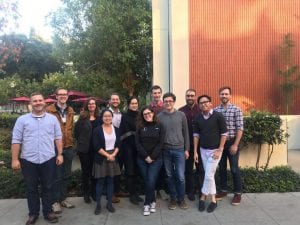ELORDIETA COLLOQUIUM
Visiting professor Gorka Elordieta will be giving a colloquium Friday, December 7, from 1:20-2:50 PM in Humanities 210. The title of his talk is, “Unaccented words, headedness, and prosodic phrasing in Northern Bizkaian Basque.” The abstract is given below:
Northern Bizkaian Basque (NBB) has accented and unaccented lexical words, like
in Tokyo Japanese. Unaccented words that are also syntactic phrases never
constitute independent phonological phrases and have to group with the following
word, unlike accented words (cf. Elordieta 1997, 1998, 2007a, 2007b). Assuming
the correspondence between syntactic phrases and phonological phrases as in
Match Theory (Selkirk 2009, 2011, Elfner 2012, 2015; Elordieta 2015; Bennett,
Elfner and McCloskey 2016, among others), this is an issue to attend to. We
propose a formal explanation for the deficiency of unaccented words under five
assumptions: (i) the presence of a constraint that calls for every phonological
phrase to be headed, i.e. to have a prosodic word that is the head; (ii) NBB
unaccented words lack a prosodic head; (iii) a prosodic word that does not have a
head cannot be a head of the phonological phrase (prosodic constituents must be
headed all the way down, cf. Selkirk 2007); (iv) the above mentioned constraints
dominate the constraint that rules out any deletion of phonological phrases (or
lack of correspondence between syntactic phrases and phonological phrases).
